- Home
- Robert E. Howard
Valley of the Worm Page 2
Valley of the Worm Read online
Page 2
But he put aside his fears and mounted to the bronze door, whose smooth surface offered no bolt or catch. Not for naught had he gained access into darksome cults, had harkened to the grisly whispers of the votaries of Skelos under midnight trees, and read the forbidden iron-bound books of Vathelos the Blind.
Kneeling before the portal, he searched the sill with nimble fingers; their sensitive tips found projections too small for the eye to detect, or for less-skilled fingers to discover. These he pressed carefully and according to a peculiar system, muttering a long-forgotten incantation as he did so. As he pressed the last projection, he sprang up with frantic haste and struck the exact center of the door a quick sharp blow with his open hand.
There was no rasp of spring or hinge, but the door retreated inward, and the breath hissed explosively from Shevatas’ clenched teeth. A short narrow corridor was disclosed. Down this the door had slid, and was now in place at the other end. The floor, ceiling and sides of the tunnel-like aperture were of ivory, and now from an opening on one side came a silent writhing horror that reared up and glared on the intruder with awful luminous eyes; a serpent twenty feet long, with shimmering, iridescent scales.
The thief did not waste time in conjecturing what night-black pits lying below the dome had given sustenance to the monster. Gingerly he drew the sword, and from it dripped a greenish liquid exactly like that which slavered from the scimitar-fangs of the reptile. The blade was steeped in the poison of the snake’s own kind, and the obtaining of that venom from the fiend-haunted swamps of Zingara would have made a saga in itself.
Shevatas advanced warily on the balls of his feet, knees bent slightly, ready to spring either way like a flash of light. And he needed all his coordinate speed when the snake arched its neck and struck, shooting out its full length like a stroke of lightning. For all his quickness of nerve and eye, Shevatas had died then but for chance. His well-laid plans of leaping aside and striking down on the outstretched neck were put at naught by the blinding speed of the reptile’s attack. The thief had but time to extend the sword in front of him, involuntarily closing his eyes and crying out. Then the sword was wrenched from his hand and the corridor was filled with a horrible thrashing and lashing.
Opening his eyes, amazed to find himself still alive, Shevatas saw the monster heaving and twisting its slimy form in fantastic contortions, the sword transfixing its giant jaws. Sheer chance had hurled it full against the point he had held out blindly. A few moments later the serpent sank into shining, scarcely quivering coils, as the poison on the blade struck home.
Gingerly stepping over it, the thief thrust against the door, which this time slid aside, revealing the interior of the dome. Shevatas cried out; instead of utter darkness he had come into a crimson light that throbbed and pulsed almost beyond the endurance of mortal eyes. It came from a gigantic red jewel high up in the vaulted arch of the dome. Shevatas gaped, inured though he was to the sight of riches. The treasure was there, heaped in staggering profusion—piles of diamonds, sapphires, rubies, turquoises, opals, emeralds; zikkurats of jade, jet and lapis lazuli; pyramids of gold wedges; teocallis of silver ingots; jewel-hilted swords in cloth-of-gold sheaths; golden helmets with colored horsehair crests, or black and scarlet plumes; silver-scaled corselets; gem-crusted harness worn by warrior-kings three thousand years in their tombs; goblets carven of single jewels; skulls plated with gold, with moonstones for eyes; necklaces of human teeth set with jewels. The ivory floor was covered inches deep with gold dust that sparkled and shimmered under the crimson glow with a million scintillant lights. The thief stood in a wonderland of magic and splendor, treading stars under his sandaled feet.
But his eyes were focused on the dais of crystal which rose in the midst of the shimmering array, directly under the red jewel, and on which should be lying the moldering bones, turning to dust with the crawling of the centuries. And as Shevatas looked, the blood drained from his dark features; his marrow turned to ice, and the skin of his back crawled and wrinkled with horror, while his lips worked soundlessly. But suddenly he found his voice in one awful scream that rang hideously under the arching dome. Then again the silence of the ages lay among the ruins of mysterious Kuthchemes.
2.
Rumors drifted up through the meadowlands, into the cities of the Hyborians. The word ran along the caravans, the long camel-trains plodding through the sands, herded by lean hawk-eyed men in white kaftans. It was passed on by the hook-nosed herdsmen of the grasslands, from the dwellers in tents to the dwellers in the squat stone cities where kings with curled blue-black beards worshipped round-bellied gods with curious rites. The word passed up through the fringe of hills where gaunt tribesmen took toll of the caravans. The rumors came into the fertile uplands where stately cities rose above blue lakes and rivers: the rumors marched along the broad white roads thronged with ox-wains, with lowing herds, with rich merchants, knights in steel, archers and priests.
They were rumors from the desert that lies east of Stygia, far south of the Kothian hills. A new prophet had risen among the nomads. Men spoke of tribal war, of a gathering of vultures in the southeast, and a terrible leader who led his swiftly increasing hordes to victory. The Stygians, ever a menace to the northern nations, were apparently not connected with this movement; for they were massing armies on their eastern borders and their priests were making magic to fight that of the desert sorcerer, whom men called Natohk, the Veiled One; for his features were always masked.
But the tide swept northwestward, and the blue-bearded kings died before the altars of their pot-bellied gods, and their squat-walled cities were drenched in blood. Men said that the uplands of the Hyborians were the goal of Natohk and his chanting votaries.
Raids from the desert were not uncommon, but this latest movement seemed to promise more than a raid. Rumor said Natohk had welded thirty nomadic tribes and fifteen cities into his following, and that a rebellious Stygian prince had joined him. This latter lent the affair an aspect of real war.
Characteristically most of the Hyborian nations were prone to ignore the growing menace. But in Khoraja, carved out of Shemite lands by the swords of Kothic adventurers, heed was given. Lying southeast of Koth, it would bear the brunt of the invasion. And its young king was captive to the treacherous king of Ophir, who hesitated between restoring him for a huge ransom, or handing him over to his enemy, the penurious king of Koth, who offered no gold, but an advantageous treaty. Meanwhile, the rule of the struggling kingdom was in the white hands of young princess Yasmela, the king’s sister.
Minstrels sang her beauty throughout the western world, and the pride of a kingly dynasty was hers. But on that night her pride was dropped from her like a cloak. In her chamber whose ceiling was a lapis lazuli dome, whose marble floor was littered with rare furs, and whose walls were lavish with golden frieze-work, ten girls, daughters of nobles, their slender limbs weighted with gem-crusted armlets and anklets, slumbered on velvet couches about the royal bed with its golden dais and silken canopy. But princess Yasmela lolled not on that silken bed. She lay naked on her supple belly upon the bare marble like the most abased suppliant, her dark hair streaming over her white shoulders, her slender fingers intertwined. She lay and writhed in pure horror that froze the blood in her lithe limbs and dilated her beautiful eyes, that pricked the roots of her dark hair and made goose-flesh rise along her supple spine.
Above her, in the darkest corner of the marble chamber, lurked a vast shapeless shadow. It was no living thing of form or flesh and blood. It was a clot of darkness, a blur in the sight, a monstrous night-born incubus that might have been deemed a figment of a sleep-drugged brain, but for the points of blazing yellow fire that glimmered like two eyes from the blackness.
Moreover a voice issued from it—a low subtle inhuman sibilance that was more like the soft abominable hissing of a serpent than anything else, and that apparently could not emanate from anything with human lips. Its sound as well as its import filled Yasmela with a shuddering h
orror so intolerable that she writhed and twisted her slender body as if beneath a lash, as though to rid her mind of its insinuating vileness by physical contortion.
“You are marked for mine, princess,” came the gloating whisper. “Before I wakened from the long sleep I had marked you, and yearned for you, but I was held fast by the ancient spell by which I escaped mine enemies. I am the soul of Natohk, the Veiled One! Look well upon me, princess! Soon you shall behold me in my bodily guise, and shall love me!”
The ghostly hissing dwindled off in lustful titterings, and Yasmela moaned and beat the marble tiles with her small fists in her ecstasy of terror.
“I sleep in the palace chamber of Akbatana,” the sibilances continued. “There my body lies in its frame of bones and flesh. But it is but an empty shell from which the spirit has flown for a brief space. Could you gaze from that palace casement you would realize the futility of resistance. The desert is a rose-garden beneath the moon, where blossom the fires of a hundred thousand warriors. As an avalanche sweeps onward, gathering bulk and momentum, I will sweep into the lands of mine ancient enemies. Their kings shall furnish me skulls for goblets, their women and children shall be slaves of my slaves’ slaves. I have grown strong in the long years of dreaming. . . .
“But thou shalt be my queen, oh princess! I will teach thee the ancient forgotten ways of pleasure. We—” Before the stream of cosmic obscenity which poured from the shadowy colossus, Yasmela cringed and writhed as if from a whip that flayed her dainty bare flesh.
“Remember!” whispered the horror. “The days will not be many before I come to claim mine own!”
Yasmela, pressing her face against the tiles and stopping her pink ears with her dainty fingers, yet seemed to hear a strange sweeping noise, like the beat of bat-wings. Then, looking fearfully up, she saw only the moon that shone through the window with a beam that rested like a silver sword across the spot where the phantom had lurked. Trembling in every limb, she rose and staggered to a satin couch, where she threw herself down, weeping hysterically. The girls slept on, but one, who roused, yawned, stretched her slender figure and blinked about. Instantly she was on her knees beside the couch, her arms about Yasmela’s supple waist.
“Was it—was it—?” Her dark eyes were wide with fright. Yasmela caught her in a convulsive grasp.
“Oh, Vateesa, It came again! I saw It—heard It speak! It spoke Its name—Natohk! It is Natohk! It is not a nightmare—it towered over me while the girls slept like drugged ones. What—oh, what shall I do?”
Vateesa twisted a golden bracelet about her rounded arm, in meditation.
“Oh, princess,” she said, “it is evident that no mortal power can deal with It, and the charm is useless that the priests of Ishtar gave you. Therefore seek you the forgotten oracle of Mitra.”
In spite of her recent fright, Yasmela shuddered. The gods of yesterday become the devils of tomorrow. The Kothians had long since abandoned the worship of Mitra, forgetting the attributes of the universal Hyborian god. Yasmela had a vague idea that, being very ancient, it followed that the deity was very terrible. Ishtar was much to be feared, and all the gods of Koth. Kothian culture and religion had suffered from a subtle admixture of Shemite and Stygian strains. The simple ways of the Hyborians had become modified to a large extent by the sensual, luxurious, yet despotic habits of the East.
“Will Mitra aid me?” Yasmela caught Vateesa’s wrist in her eagerness. “We have worshipped Ishtar so long—”
“To be sure he will!” Vateesa was the daughter of an Ophirean priest who had brought his customs with him when he fled from political enemies to Khoraja. “Seek the shrine! I will go with you.”
“I will!” Yasmela rose, but objected when Vateesa prepared to dress her. “It is not fitting that I come before the shrine clad in silk. I will go naked, on my knees, as befits a suppliant, lest Mitra deem I lack humility.”
“Nonsense!” Vateesa had scant respect for the ways of what she deemed a false cult. “Mitra would have folks stand upright before him—not crawling on their bellies like worms, or spilling blood of animals all over his altars.”
Thus objurgated, Yasmela allowed the girl to garb her in the light sleeveless silk shirt, over which was slipped a silken tunic, bound at the waist by a wide velvet girdle. Satin slippers were put upon her slender feet, and a few deft touches of Vateesa’s pink fingers arranged her dark wavy tresses. Then the princess followed the girl, who drew aside a heavy gilt-worked tapestry and threw the golden bolt of the door it concealed. This let into a narrow winding corridor, and down this the two girls went swiftly, through another door and into a broad hallway. Here stood a guardsman in crested gilt helmet, silvered cuirass and gold-chased greaves, with a long-shafted battle-ax in his hands.
A motion from Yasmela checked his exclamation, and saluting, he took his stand again beside the doorway, motionless as a brazen image. The girls traversed the hallway, which seemed immense and eery in the light of the cressets along the lofty walls, and went down a stairway where Yasmela shivered at the blots of shadows which hung in the angles of the walls. Three levels down they halted at last in a narrow corridor whose arched ceiling was crusted with jewels, whose floor was set with blocks of crystal, and whose walls were decorated with golden frieze-work. Down this shining way they stole, holding each other’s hands, to a wide portal of gilt.
Vateesa thrust open the door, revealing a shrine long forgotten except by a faithful few, and royal visitors to Khoraja’s court, mainly for whose benefit the fane was maintained. Yasmela had never entered it before, though she was born in the palace. Plain and unadorned in comparison to the lavish display of Ishtar’s shrines, there was about it a simplicity of dignity and beauty characteristic of the Mitran religion.
The ceiling was lofty, but it was not domed, and was of plain white marble, as were the walls and floor, the former with a narrow gold frieze running about them. Behind an altar of clear green jade, unstained with sacrifice, stood the pedestal whereon sat the material manifestation of the deity. Yasmela looked in awe at the sweep of the magnificent shoulders, the clear-cut features—the wide straight eyes, the patriarchal beard, the thick curls of the hair, confined by a simple band about the temples. This, though she did not know it, was art in its highest form—the free, uncramped artistic expression of a highly esthetic race, unhampered by conventional symbolism.
She fell on her knees and thence prostrate, regardless of Vateesa’s admonition, and Vateesa, to be on the safe side, followed her example; for after all, she was only a girl, and it was very awesome in Mitra’s shrine. But even so she could not refrain from whispering in Yasmela’s ear.
“This is but the emblem of the god. None pretends to know what Mitra looks like. This but represents him in idealized human form, as near perfection as the human mind can conceive. He does not inhabit this cold stone, as your priests tell you Ishtar does. He is everywhere—above us, and about us, and he dreams betimes in the high places among the stars. But here his being focuses. Therefore call upon him.”
“What shall I say?” whispered Yasmela in stammering terror.
“Before you can speak, Mitra knows the contents of your mind—” began Vateesa. Then both girls started violently as a voice began in the air above them. The deep, calm, bell-like tones emanated no more from the image than from anywhere else in the chamber. Again Yasmela trembled before a bodiless voice speaking to her, but this time it was not from horror or repulsion.
“Speak not, my daughter, for I know your need,” came the intonations like deep musical waves beating rhythmically along a golden beach. “In one manner may you save your kingdom, and saving it, save all the world from the fangs of the serpent which has crawled up out of the darkness of the ages. Go forth upon the streets alone, and place your kingdom in the hands of the first man you meet there.”
The unechoing tones ceased, and the girls stared at each other. Then, rising, they stole forth, nor did they speak until they stood once more in Yasmela’s
chamber. The princess stared out of the gold-barred windows. The moon had set. It was long past midnight. Sounds of revelry had died away in the gardens and on the roofs of the city. Khoraja slumbered beneath the stars, which seemed to be reflected in the cressets that twinkled among the gardens and along the streets and on the flat roofs of houses where folk slept.
“What will you do?” whispered Vateesa, all a-tremble.
“Give me my cloak,” answered Yasmela, setting her teeth.
“But alone, in the streets, at this hour!” expostulated Vateesa.
“Mitra has spoken,” replied the princess. “It might have been the voice of the god, or a trick of a priest. No matter. I will go!”
Wrapping a voluminous silken cloak about her lithe figure and donning a velvet cap from which depended a filmy veil, she passed hurriedly through the corridors and approached a bronze door where a dozen spearmen gaped at her as she passed through. This was in a wing of the palace which let directly onto the street; on all other sides it was surrounded by broad gardens, bordered by a high wall. She emerged into the street, lighted by cressets placed at regular intervals.
She hesitated; then, before her resolution could falter, she closed the door behind her. A slight shudder shook her as she glanced up and down the street, which lay silent and bare. This daughter of aristocrats had never before ventured unattended outside her ancestral palace. Then, steeling herself, she went swiftly up the street. Her satin-slippered feet fell lightly on the pave, but their soft sound brought her heart into her throat. She imagined their fall echoing thunderously through the cavernous city, rousing ragged rat-eyed figures in hidden lairs among the sewers. Every shadow seemed to hide a lurking assassin, every blank doorway to mask the slinking hounds of darkness.

 Beyond the Black River
Beyond the Black River Gods of the North
Gods of the North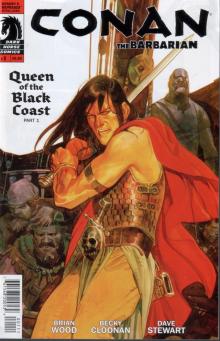 Queen of the Black Coast
Queen of the Black Coast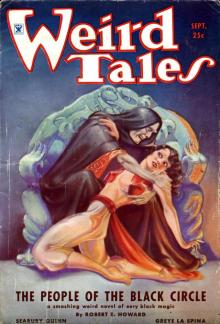 The People of the Black Circle
The People of the Black Circle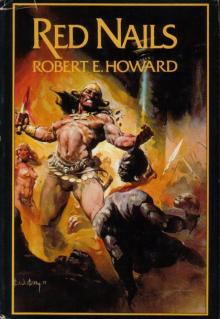 Red Nails
Red Nails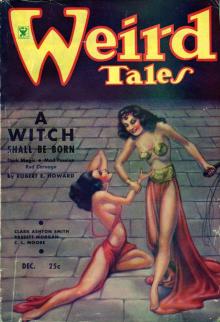 A Witch Shall Be Born
A Witch Shall Be Born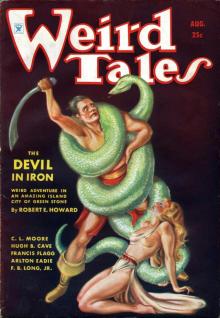 The Devil in Iron
The Devil in Iron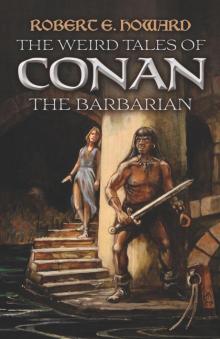 The Weird Tales of Conan the Barbarian
The Weird Tales of Conan the Barbarian The Bloody Crown of Conan
The Bloody Crown of Conan The Horror Stories of Robert E. Howard
The Horror Stories of Robert E. Howard Conan the Conqueror
Conan the Conqueror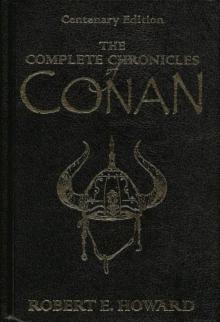 Conan the Barbarian
Conan the Barbarian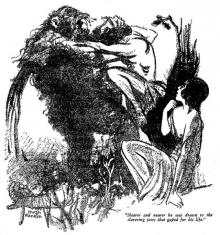 Shadows in the Moonlight
Shadows in the Moonlight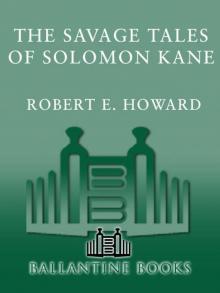 The Savage Tales of Solomon Kane
The Savage Tales of Solomon Kane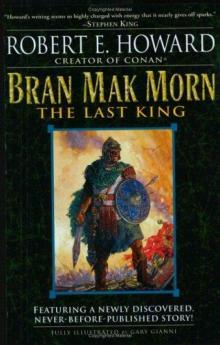 Bran Mak Morn: The Last King
Bran Mak Morn: The Last King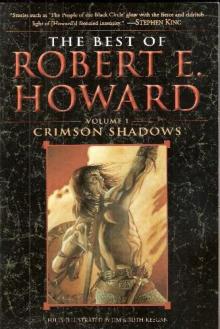 The Best of Robert E. Howard Volume One: Crimson Shadows
The Best of Robert E. Howard Volume One: Crimson Shadows The Best of Robert E. Howard: Crimson Shadows (Volume 1)
The Best of Robert E. Howard: Crimson Shadows (Volume 1) Black Hounds of Death
Black Hounds of Death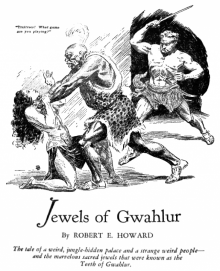 Jewels of Gwahlur
Jewels of Gwahlur Shadows in Zamboula
Shadows in Zamboula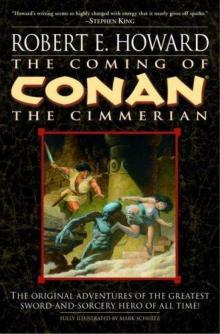 The Coming of Conan the Cimmerian
The Coming of Conan the Cimmerian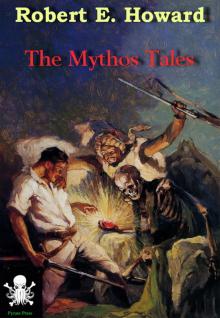 The Mythos Tales
The Mythos Tales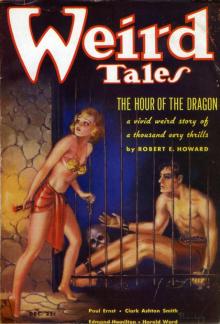 The Hour of the Dragon
The Hour of the Dragon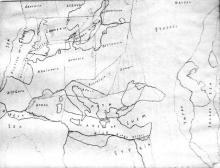 The Hyborian Age
The Hyborian Age El Borak and Other Desert Adventures
El Borak and Other Desert Adventures The Best of Robert E. Howard Volume 1 The Best of Robert E. Howard Volume 1
The Best of Robert E. Howard Volume 1 The Best of Robert E. Howard Volume 1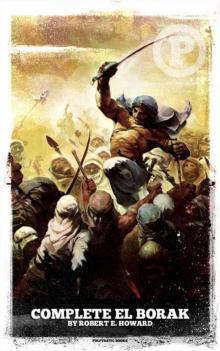 El Borak: The Complete Tales
El Borak: The Complete Tales Kull: Exile of Atlantis
Kull: Exile of Atlantis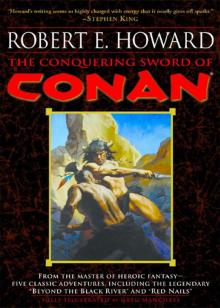 The Conquering Sword of Conan
The Conquering Sword of Conan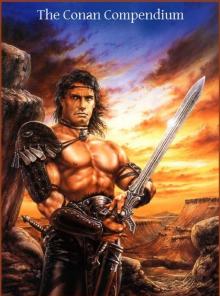 The Conan Compendium
The Conan Compendium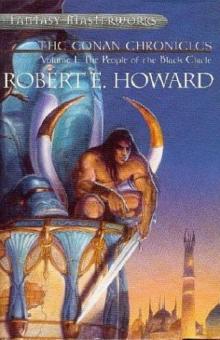 The Conan Chronicles: Volume 1: The People of the Black Circle
The Conan Chronicles: Volume 1: The People of the Black Circle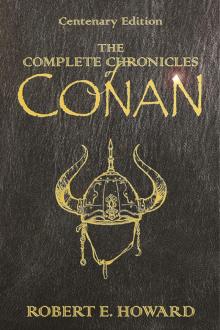 The Complete Chronicles of Conan: Centenary Edition
The Complete Chronicles of Conan: Centenary Edition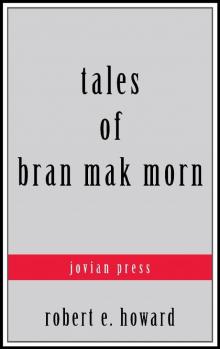 Tales of Bran Mak Morn (Serapis Classics)
Tales of Bran Mak Morn (Serapis Classics) Delphi Works of Robert E. Howard (Illustrated) (Series Four)
Delphi Works of Robert E. Howard (Illustrated) (Series Four)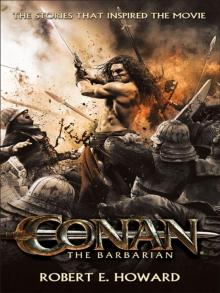 Conan the Barbarian: The Stories That Inspired the Movie
Conan the Barbarian: The Stories That Inspired the Movie People of the Dark Robert Ervin Howard
People of the Dark Robert Ervin Howard Grim Lands
Grim Lands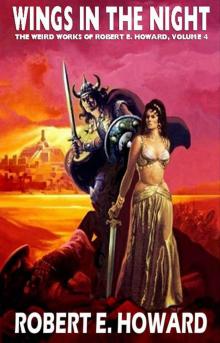 Wings in the Night
Wings in the Night Gardens of Fear
Gardens of Fear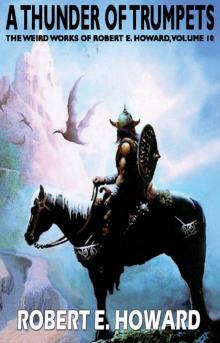 A Thunder of Trumpets
A Thunder of Trumpets Detective of the Occult
Detective of the Occult Sword Woman and Other Historical Adventures
Sword Woman and Other Historical Adventures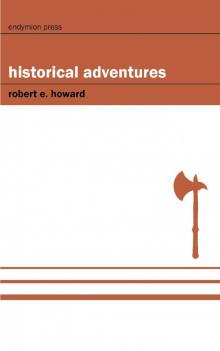 Historical Adventures
Historical Adventures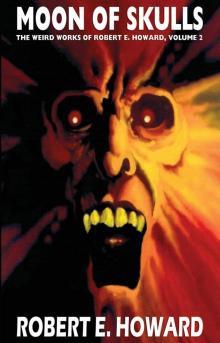 Moon of Skulls
Moon of Skulls The Robert E. Howard Omnibus: 97 Collected Stories
The Robert E. Howard Omnibus: 97 Collected Stories The Pirate Story Megapack: 25 Classic and Modern Tales
The Pirate Story Megapack: 25 Classic and Modern Tales The Best of Robert E. Howard, Volume 2
The Best of Robert E. Howard, Volume 2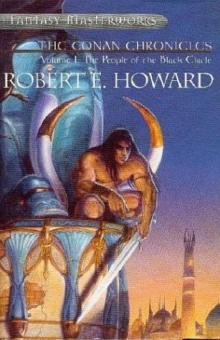 The Conan Chronicles, Vol. 1: The People of the Black Circle
The Conan Chronicles, Vol. 1: The People of the Black Circle Sword Woman and Other Historical Adventures M
Sword Woman and Other Historical Adventures M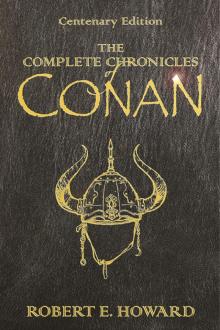 The Complete Chronicles of Conan
The Complete Chronicles of Conan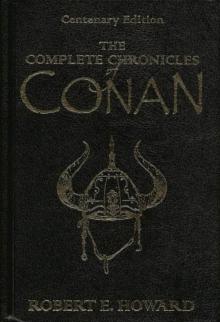 Conan the Barbarian: The Chronicles of Conan (collected short stories)
Conan the Barbarian: The Chronicles of Conan (collected short stories) The Conan the Barbarian Stories
The Conan the Barbarian Stories The Best Horror Stories of
The Best Horror Stories of Tigers Of The Sea cma-4
Tigers Of The Sea cma-4 The Hours of the Dragon
The Hours of the Dragon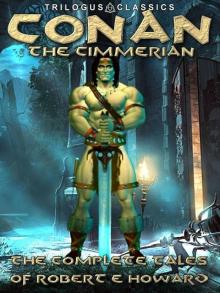 Conan the Cimmerian: The Complete Tales (Trilogus Classics)
Conan the Cimmerian: The Complete Tales (Trilogus Classics) Collected Western Stories of Robert E. Howard (Unexpurgated Edition) (Halcyon Classics)
Collected Western Stories of Robert E. Howard (Unexpurgated Edition) (Halcyon Classics) The Best of Robert E. Howard, Volume 1
The Best of Robert E. Howard, Volume 1 Shadow Kingdoms
Shadow Kingdoms